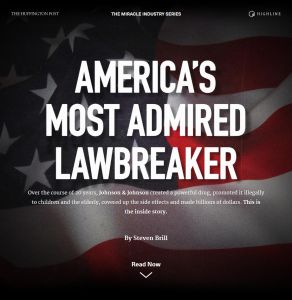Join getAbstract to access the summary!

Join getAbstract to access the summary!
Steven Brill
America's Most Admired Lawbreaker
The Huffington Post, 2015
What's inside?
Americans trust drug companies to put consumers’ well-being above profits, but is that trust misplaced?
Recommendation
Americans trust pharmaceutical companies to value consumer safety over corporate profits. And, when companies act illegally, Americans trust the government to pursue and punish the wrongdoers. But what if that trust is grossly misplaced? In this 15-part article, or “docuserial,” lawyer and journalist Steven Brill offers an in-depth account of how Johnson & Johnson knowingly and systematically violated US Food & Drug Administration restrictions when it marketed its antipsychotic drug Risperdal. Brill lays out detailed evidence showing exactly how and why the company decided to pursue “off-label” marketing of Risperdal. He asks if the court meted out adequate punishment and if its ruling really discourages such practices in the future. Noting that such stories have two sides and this is mostly one of them, getAbstract recommends this series to those interested in health care practices and regulation.
Summary
About the Author
Steven Brill is an American lawyer, journalist and recipient of multiple National Magazine Awards. Brill’s 2015 book, America’s Bitter Pill: Money, Politics, Backroom Deals, and the Fight to Fix Our Broken Healthcare System, was a New York Times bestseller.
















Comment on this summary